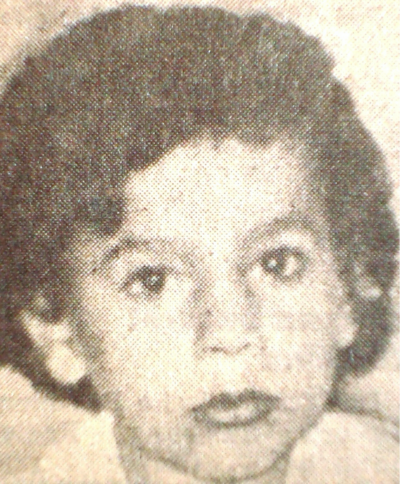
Ceremonial naming of the Çetin Mert Park
11th May | 3 pm | Green Space Skalitzer Str./Mariannenstr.
Çetin Mert (1970-1975) lived with his family in Kreuzberg. His mother Münevver was one of the first migrant workers to come to West Berlin from Turkey. On his 5th birthday, May 11, 1975, Çetin was playing on what was then Gröbenufer (now May-Ayim-Ufer) near Oberbaumbrücke when he fell into the Spree and drowned. The full width of the Spree belonged to East Berlin and entering the border area was life-threatening. He could not be rescued. Çetin Mert was one of the youngest victims of the division of Berlin (1961-1989). Before he died, four children had already drowned near the Oberbaum Bridge. After his death, there were protests by Berliners of Turkish origin. In October 1975, the Senate and the GDR government signed an agreement on rescue measures in the event of accidents in Berlin's border waters. To prevent further accidents, a fence was erected on the banks of the Gröbenufer.
Film evening “Mein Kiez. History(s) of the divided Berlin”
16th May | 6 pm | Roof top FHXB Museums
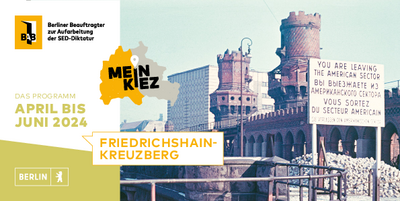
As a film student in 1991, Can Candan interviewed migrants of Turkish origin from Kreuzberg: What did the fall of the Wall mean for them and their everyday lives? What fears and hopes did they associate with it? How did they deal with the flare-up of racism?
In “Walls 2.0”, authors Jana König, Elisabeth Steffen and Inga Turczyn interview some of the participants in “Duvarlar” again: How do they view issues such as racism, nationalism and economic exploitation today? Are there new 'walls'? People from the eastern part of Berlin also have their say.
“Duvarlar - Mauern - Walls” (D, 2000), directed by Can Candan
Excerpts from the film “Walls 2.0 - migrant and anti-racist perspectives on the fall of the Wall” (D, 2011)
Film talk
Pia Eiringhaus, Curator Outreach at the Berlin Wall Foundation
Jana König, Head of Collection at the FHXB Museum
Inga Turczyn, freelance author and director for documentary film
Moderation: Nora Hogrefe, Head of the Coordination Office for Historical City Markings, Active Museum
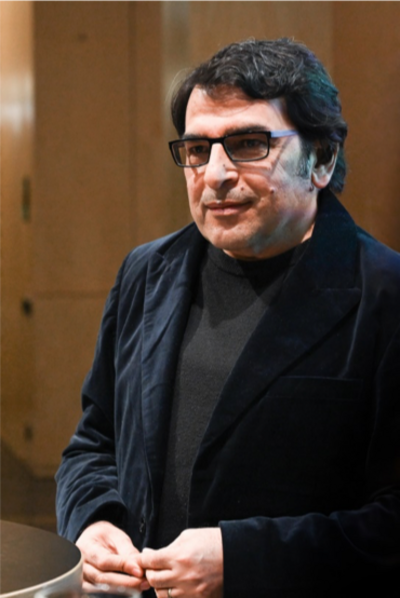
"99 scattered pearls" - Reading with Halim Youssef
23 May | 6 pm | Rooftop floor of the FHXB Museum
As part of the Kurdish Culture Days, Yekmal e.V. invites you to a reading with Halim Youssef followed by a discussion with Sozdar Jafarzadeh at the FHXB Friedrichshain-Kreuzberg Museum.
Halim Youssef is a German-Syrian writer and translator. Born in northern Syria, he now lives in Germany and writes short stories, plays and novels in Kurdish, Arabic and German, in which he explores themes such as identity, migration and homelessness.
His novel "99 Scattered Pearls" tells the story of the translator Azados, who comes to Germany from northern Syria, based on his own life. Here he meets, among others, Hamza, a refugee from Turkey who was persecuted as a Kurd in his home country and is labelled a 'Turk' by right-wingers in Germany. In 99 chapters, the relationship between language, belonging and self-realisation is dealt with in a tense and sensitive way, while at the same time the conditions under which Kurdish people live in Syria, Turkey and Iraq, but also here in Germany, become clear.
Following the reading, Halim Youssef and Sozdar Jafarzadeh will discuss perspectives and realities of literary work and self-realisation in the diaspora and invite the audience to join in the discussion.
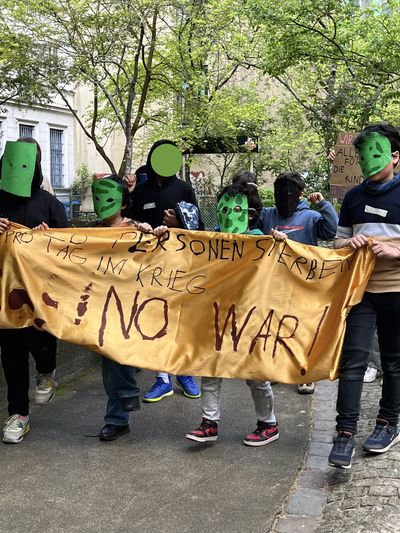
Verlängerung der Ausstellung "Wir nennen es Revolution. Transnationaler Aktivismus in Berlin" bis zum 26. Mai 2024!
Ab Mitte Mai können in der Ausstellung außerdem die Ergebnisse des Vermittlungsprojekts Ein gemeinsames Morgen gestalten. Translokale Solidaritäten von Daniela Medina Poch in Kooperation mit der Hausburgschule und dem FHXB Museum gesehen werden.
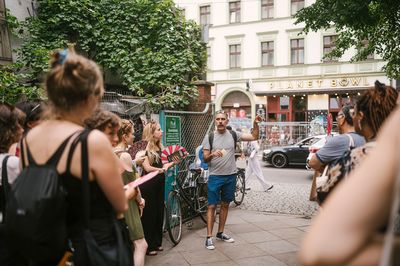
Lange Woche der Kiezgeschichte: Stadtführungen in Kreuzberg und Friedrichshain am 25. Mai, 29. Mai und 1. Juni
Stadtrundgang 1:
Migrantische Selbstorganisation gegen Rassismus und Faschismus
Samstag, 25.05., 13 Uhr
Treffpunkt: Garten des FHXB Museums
Beim Stadtrundgang am Kottbusser Tor, dem Knotenpunkt von Kreuzbergs Migration geprägter Geschichte seit den 1960ern, erkunden wir gemeinsam Orte sozialer Dynamik migrantischer Selbstorganisation und des Widerstands gegen Rassismus und Faschismus. Eine Reise durch Zeit und Raum, die uns die Kraft der Solidarität und des politischen Engagements in Kreuzberg näherbringt.
Anmeldung erforderlich
Kontakt: veranstaltungenfhxb-museum.REMOVE-THIS.de
Stadtrundgang 2: Der 17. Juni 1953 in Friedrichshain
Mittwoch, 29.05., 17 Uhr
Treffpunkt: Frankfurter Tor an der Treppe vor der Kneipe „Brewdog“
Vor 71 Jahren kam es am 17. Juni zum landesweiten Volksaufstand in der DDR. Im Stadtteil Friedrichshain gibt es rund um die ehemalige Stalinallee zahlreiche biographische und geographische Bezüge, die es bei dieser Stadtführung zu entdecken gibt.
Anmeldung erwünscht
Kontakt: Tom-Aaron Aschke, tomaaron.aschkegmail.REMOVE-THIS.com
Stadtrundgang 3: Kraftwerk, Klavierpest und Kohleberg. Eine Konsum- und Umweltgeschichte Kreuzbergs
Samstag, 01.06., 13:30 Uhr
Treffpunkt: Ohlauer Str./Paul-Lincke-Ufer
Umweltgeschichte widmet sich den vielen Wechselwirkungen zwischen Mensch und Umwelt. Der Kampf gegen Mikroben wird uns bei dem Stadtrundgang ebenso beschäftigen wie der Wandel der Haushaltsführung und unsere Rolle als Konsument*innen. Auch die vielen Kämpfe der Berliner*innen für Volksparks, Radwege und eine lebenswerte Umwelt werden wir verfolgen.
Anmeldung erwünscht
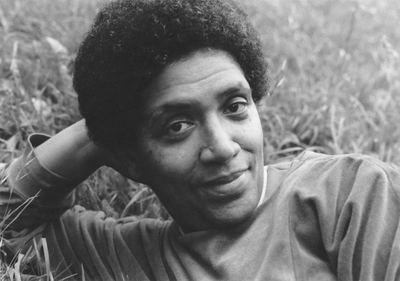
Audre Lorde – The Berlin Years
19 February | 6pm | FHXB Museum
The African-American lesbian poet and activist Audre Geraldine Lorde (1934-1992) had a significant influence on the Black women's movement worldwide with her work against homophobia, sexism and racism. Audre Lorde often spent time in West Berlin between 1984 and 1992. Here she gave readings and lectures, called for a fight against racism and encouraged Black women to make their own history visible.
To mark the renaming of a street after Audre Lorde, the FHXB Museum is showing the photo exhibition "Audre Lorde - The Berlin Years". This exhibition was originally shown in 2014-2015 at the John F. Kennedy Institute for North American Studies at Freie Universität Berlin, where Audre Lorde held a visiting professorship in 1984. The portraits by Dagmar Schultz show Audre Lorde in various places in and outside Berlin, both in private moments and in her socio-political commitment.
Intervention in the permanent exhibition "ortsgespräche - ferngespräche - ortsgeschichten"
Duration: 20.02.2024 - 30.06.2024

OUT.CAST
The new podcast out.cast can now be heard (almost) everywhere there are podcasts!
Over the past two months, a group of activists and artists have been working intensively on concepts, research, interviews and editing techniques, supported by several workshops organised by studio lärm at the FHXB Museum. The result is five stand-alone yet interconnected audio pieces with stories, sounds and original sounds that tell of dreams and struggles.
--> out.cast bei allen Plattformen
--> out.cast bei Spotify
--> out.cast bei SoundCloud






